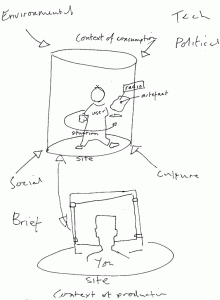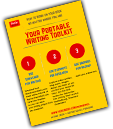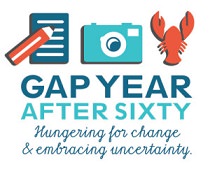Context vs. content: what sells your book?
 Context is one of those words that sparks a multidimensional image in your head. That is key to understanding why context (who, where, how, what, why) has as much to do with the success or popularity of a new book as does the actual content of that book.
Context is one of those words that sparks a multidimensional image in your head. That is key to understanding why context (who, where, how, what, why) has as much to do with the success or popularity of a new book as does the actual content of that book.
Who recommended the book to you? That counts for a lot. You tend to trust recommendations from friends who are discerning and on top of what’s new.
Where did you hear about the book? Were you online, on a social network like Facebook or Twitter, where it required no more than a couple of clicks to download the book in digital format to your favorite e-reader? Were you reading a print newspaper or an in-flight magazine?
How do you prefer to read a book? Are you comfortable with digital reading? How important is instant gratification when you hear about a new book that captures your interest? If you prefer print, it means a trip to the bookstore (if there is still one open near you). Or ordering from Amazon and waiting a couple of days for delivery. That’s OK if it’s your preference.
What was the message about the book, its title or perhaps the design of the cover that grabbed you?
"[There] will be a new set of cues. We’ll look a lot harder for reviews and cover art and inbound links."
– Seth Godin writing on The Domino Project blog, Dec. 16, 2011
Why did you decide to purchase this book right now? Was it the $.99 price? Was it the availability of an (instant) free sample?
Context is linked to reading device
How and Why are the most important pieces of context these days. And they are device dependent. After hearing about your book, online or off, how fast can readers get their hands on it? About 5 seconds if it’s a Kindle eBook. Readers can dive in via multiple devices: smartphones, iPad, Kindle Cloud Reader and Kindle. That’s why our Beta Authors are writing a short Kindle eBook. To shorten the distance between author and reader.
There are too many steps (hurdles) to start reading if you post a short book to Scribd, for example. You may be offering it in different e-reader formats (.mobi for Kindle, .epub for almost everything else, PDF for those not using e-readers) but you are asking your readers to do extra work. Each format has to be downloaded and/or uploaded to its respective device.
* Illustration credit: Context drawing above courtesy of Matt Jones of Berg design consultancy in London.

-
http://freetraffictip.com Tinu
-
http://www.debbieweil.com Debbie Weil
-
http://freetraffictip.com Tinu
-
Laura Childs
-
http://freetraffictip.com Tinu
-
Laura Childs
-
http://freetraffictip.com Tinu
-
-
-
-
-
http://twitter.com/Jillfoster Jill Foster
-
http://www.debbieweil.com Debbie Weil
-
http://freetraffictip.com Tinu
-
http://www.debbieweil.com Debbie Weil
-
-
-

 Want to reinvent your life and work after age 60? Follow Sam and me as we reinvent a yin yang life on the coast of Maine and in Brooklyn.
Want to reinvent your life and work after age 60? Follow Sam and me as we reinvent a yin yang life on the coast of Maine and in Brooklyn.







